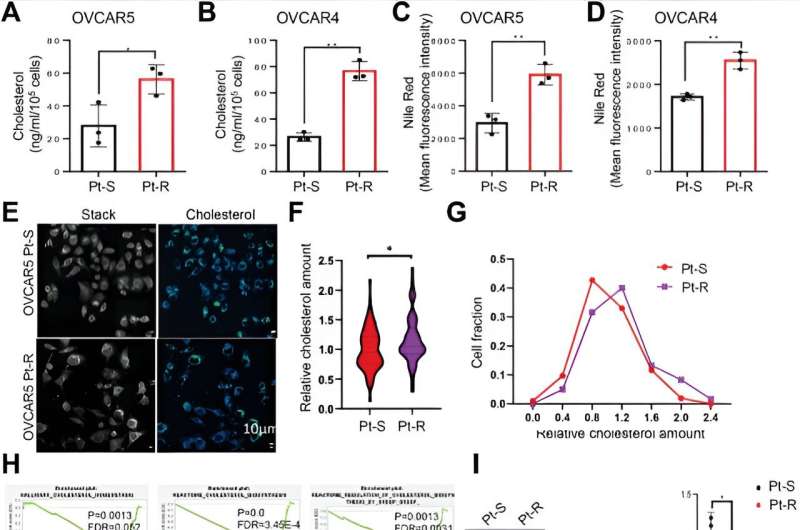This article has been reviewed according to Science X's editorial process and policies. Editors have highlighted the following attributes while ensuring the content's credibility:
fact-checked
trusted source
proofread
Outsmarting chemo-resistant ovarian cancer with nanoparticle treatment

Women diagnosed with ovarian cancer may initially respond well to chemotherapy, but the majority of them will develop resistance to treatment and die from the disease. Now Northwestern Medicine scientists have discovered the Achilles heel of chemotherapy-resistant ovarian cancer—its hunger for cholesterol—and how to sneakily use that to destroy it.
Their findings are published in the journal Advanced Science.
In the new study, scientists first showed that chemotherapy-resistant ovarian cancer cells and tumors are rich in cholesterol due to an increased uptake of it. They then deployed a synthetic nanoparticle that appeared to the cancer cells as a natural one rich in cholesterol.
But when the cancer cells bound the fake particle, the mimic actually blocked cholesterol uptake. Additionally, the scientists showed that reducing cholesterol tricked the cancer cells down a cell death pathway. Treatment with the nanoparticle reduced ovarian tumor growth by more than 50% in human cells and animal models.
"This is a new weapon to destroy resistant ovarian cancer," said co-corresponding author C. Shad Thaxton, associate professor of urology at Northwestern University Feinberg School of Medicine.
"More than 18,000 women die of ovarian cancer every year," said co-corresponding author Dr. Daniela Matei, a professor of medicine at Northwestern University Feinberg School of Medicine and a Northwestern Medicine oncologist. "Finding new ways to attack resistant cancer cells is very important."
Matei and Thaxton show the way the cells die after treatment with these nanoparticles is a form of cell death executed through oxidation of lipids in the cell membrane.
"These cancer cells are resistant to the typical form of death—apoptosis—which is why chemo can't kill them," Matei said.
The ovarian cancer findings build on Thaxton and Dr. Leo Gordon's earlier pre-clinical research using nanoparticles to treat lymphoma.
The new study showed that the approach also works in ovarian cancer cells.
Matei and Thaxton tested the nanoparticles in ovarian cancer cells and in animals with xenografts of chemotherapy-resistant ovarian cancer. The next step in the research is to test a combination of the particles with traditional chemotherapy and study the effects of the nanoparticles on immune cells that fight against cancer.
More information: Yinu Wang et al, Nanoparticle Targeting in Chemo‐Resistant Ovarian Cancer Reveals Dual Axis of Therapeutic Vulnerability Involving Cholesterol Uptake and Cell Redox Balance, Advanced Science (2024). DOI: 10.1002/advs.202305212



















